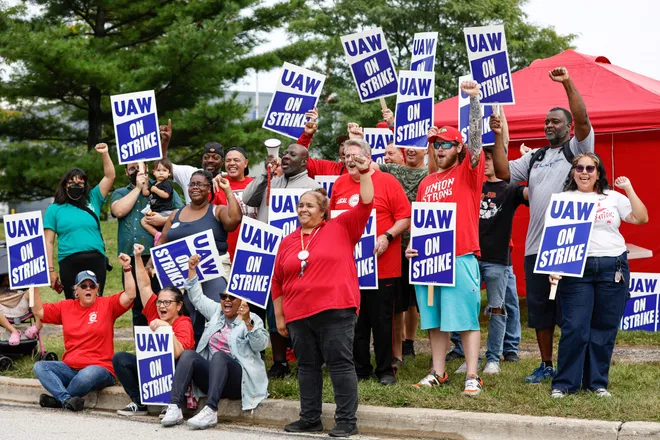Biden says he's most pro-union president ever. But his policies hurt striking UAW workers.
The historic United Auto Workers strike against the Big Three automakers shows no signs of stopping anytime soon.
It is no wonder that UAW members are nervous about their future. To start, they have a president who claims to be the most pro-union in history but has implemented policies that hurt workers’ paychecks and will lead to the loss of thousands of auto manufacturing jobs.
Under their current contract, UAW members’ pay has risen by 6% since 2019. Yet, inflation has pushed up prices by 17% since the start of the Biden administration in 2021. The cost of everything from groceries to gas has skyrocketed, and UAW members − like many Americans − are struggling to make ends meet.
Federal manufacturing regulations also are out of control and are hurting all manufacturing businesses. This year, 131 organizations launched the Manufacturers for Sensible Regulations coalition to push back against the onslaught of new regulations targeting their industries.
The companies say they have “never seen this level (of regulation) before in any administration,” and many have said they would pay their workers more and hire more workers if their regulatory burden were lighter.
Now, the Biden administration is pushing electric vehicle policies that threaten many autoworkers’ jobs. One proposed rule from the Environmental Protection Agency would eliminate 117,000 autoworker jobs by forcing Americans to buy electric vehicles. Electric vehicles require less labor to assemble than traditional vehicles.
Biden must pick side in UAW strike:It's time for the president to choose between his union allies and the US economy
Transition to electric vehicles may eliminate union jobs
The Inflation Reduction Act that President Joe Biden signed provides up to $7,500 subsidy for each electric vehicle sold. These subsidies are accelerating the transition away from conventional vehicles − and union jobs. It is irresponsible for the federal government to force this transition on the American people so quickly and with such a disregard for American workers.
On top of all of this, UAW members have a union that is supposed to represent their interests first and foremost but has instead been complicit in their jobs’ destruction. UAW leadership has supported politicians, policies and now contract terms that hurt their members in the long run.

Many autoworkers see their jobs as generational − jobs meant to be passed on to their kids and grandkids. Quite a few have uncles, aunts, cousins and other family members all working for the same company.
UAW members − like all workers − should have contracts that keep up with inflation and provide stable, well-paying jobs that make it possible for them to pay their bills and raise their families. The new contract must also allow the companies to grow and flourish, so that they can create jobs for future generations.
Unfortunately, UAW leadership continues to advocate for their own best interests.
Those who have worked in the auto industry know that negotiations must walk a fine line. If the Big Three have to file for bankruptcy protection, as General Motors and Chrysler did in 2009, all autoworkers are in a much more precarious position. UAW leadership has a responsibility to preserve their members’ jobs − securing raises that will improve their members’ standards of living, but that are not so excessive they threaten workers’ long-term job security.
UAW to GM president:Show me a Big 3 auto executive who'd work for our union pay
Biden's policies have hurt American workers
Moving forward, UAW leadership should target the real problem: Bidenomics. The UAW supported Biden in 2020 and enthusiastically endorsed his Inflation Reduction Act, despite the fact that it included electric vehicle subsidies that are accelerating the elimination of union jobs.
Biden’s huge deficit spending bills have increased the rate of inflation, which is hurting autoworkers whose salaries have not kept up.
Biden's economy costs Americans:Biden is trying to sell 'Bidenomics,' but Americans can't afford the president's agenda
UAW members have paid attention to this contradiction. In April, after Stellantis announced job cuts, a group of Detroit workers stated that auto companies “plan to close plants and cut tens of thousands of jobs as part of their transition to electric vehicle production.” They accused UAW leaders of “keeping this information from us even though half the jobs in industry could be cut.”
If UAW leadership does not change course and start to prioritize its members’ interests, it will be in danger of repeating its mistakes and watching its membership continue to fall. At its peak in 1979, the UAW represented about 1.5 million autoworkers. Since then, despite growth in the auto industry, UAW membership has fallen to almost 400,000 workers, including just 146,000 at the Big Three.
UAW leaders would do well to focus on securing a realistic, mutually beneficial contract for the members they have now and protecting their members from Bidenomics.
Autoworkers deserve better than a leadership that bets their members’ economic future in exchange for short-term political gain, and they deserve leadership in Washington that puts America first.
Linda McMahon, former administrator of the U.S. Small Business Administration, is chair of the America First Policy Institute and of AFPI’s Center for the American Worker. Terry Bowman is a UAW-represented Ford autoworker and the board chair of the Institute for the American Worker.
Disclaimer: The copyright of this article belongs to the original author. Reposting this article is solely for the purpose of information dissemination and does not constitute any investment advice. If there is any infringement, please contact us immediately. We will make corrections or deletions as necessary. Thank you.







